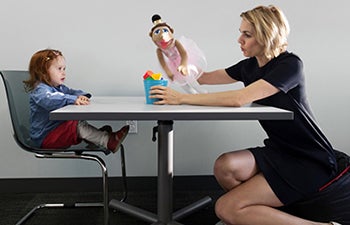Understanding Suspense
Here’s a psychology experiment you can try at home: Watch a Hitchcock film with someone and observe how they respond as the story unfolds.
Hitchcock’s plots are like the Swiss watches of suspense, designed to twist and turn and leave a knot in your gut. When we see a character on the verge of surprise, about to discover a murder, we gasp. The conflict becomes mirrored in our body language, with viewers sitting forward, eyes wide, hands clenched up.


This body language is just as visceral in children.
A new USC study detected similar responses in toddlers as young as two to three years old, younger than suggested by previous research. The study has wider implications as to when children can imagine the state of mind of another person, said lead author Henrike Moll, director of USC Dornsife’s Minds in Development Lab.
Her study, published in Developmental Science, challenges assumptions that young children are primarily egocentric, failing to understand views of the world which differ from their own.
“We know children identify with other people,” said Moll, assistant professor of psychology. “They’re moved and touched by what happens to others. They’re empathic from a young age. We capitalized on this empathic orientation to uncover children’s insights into the beliefs and expectations of others.”

Henrike Moll plays with a young child. Photo courtesy of Henrike Moll.
Moll and her colleagues used puppet shows to induce suspense in their young subjects. These simple stories involved, for example, a protagonist walking off stage after proudly presenting his belongings, such as a large stack of cookies, to the child. Then, an antagonist appeared and removed nearly all of the cookies, leaving their owner in for a rude surprise.
Suspense is “rooted in the awareness of a clash between one’s own knowledge and another’s false expectations,” Moll said.
When we go to the store and find it to be closed, we might be both surprised and disappointed — false expectations have an affective aftermath.
However, previous research on the subject took a highly rational approach while ignoring that emotional charge. Young children would be quizzed on their responses after watching similar mini-dramas. Moll argues that these studies overlooked the fact that children can feel these emotions before they can actually put them into words.
Her study took an integrative approach, combining interview questions along with videotaping children’s responses as they watched the drama unfold. The children’s facial expressions, along with other signs of tension, showed that they anticipated the character’s impending surprise and disappointment.
“In these expressions, toddlers affectively show their knowledge of what another thinks and feels,” Moll said. “Even though they aren’t capable of expressing this knowledge in fully articulated sentences, their responses of suspense demonstrate their understanding of the situation.
“We really want to know when children start being able to understand another’s mind. There’s this idea that young kids are egocentric, that they’re locked into a perspective of the world and fail to understand what others are thinking. We’re fighting this notion of childhood egocentrism.”